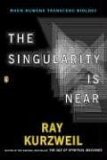Summary | Excerpt | Reviews | Beyond the Book | Readalikes | Genres & Themes | Author Bio

Critics' Opinion:
Readers' Opinion:
First Published:
Sep 2005, 672 pages
Paperback:
Sep 2006, 672 pages
Some observers question whether we are capable of applying
our own thinking to understand our own thinking. AI researcher Douglas
Hofstadter muses that 'it could be simply an accident of fate that our brains
are too weak to understand themselves. Think of the lowly giraffe, for instance,
whose brain is obviously far below the level required for self-understanding—yet
it is remarkably similar to our brain.' However, we have already succeeded in
modeling portions of our brain—neurons and substantial neural regions—and the
complexity of such models is growing rapidly. Our progress in reverse
engineering the human brain, a key issue that I will describe in detail in this
book, demonstrates that we do indeed have the ability to understand, to model,
and to extend our own intelligence. This is one aspect of the uniqueness of our
species: our intelligence is just sufficiently above the critical threshold
necessary for us to scale our own ability to unrestricted heights of creative
power—and we have the opposable appendage (our thumbs) necessary to manipulate
the universe to our will.
A word on magic: when I was reading the Tom Swift Jr. books,
I was also an avid magician. I enjoyed the delight of my audiences in
experiencing apparently impossible transformations of reality. In my teen years,
I replaced my parlor magic with technology projects. I discovered that unlike
mere tricks, technology does not lose its transcendent power when its secrets
are revealed. I am often reminded of Arthur C. Clarke's third law, that 'any
sufficiently advanced technology is indistinguishable from magic.'
Consider J. K. Rowling's Harry Potter stories from this
perspective. These tales may be imaginary, but they are not unreasonable visions
of our world as it will exist only a few decades from now. Essentially all of
the Potter 'magic' will be realized through the technologies I will explore in
this book. Playing quidditch and transforming people and objects into other
forms will be feasible in full-immersion virtual-reality environments, as well
as in real reality, using nanoscale devices. More dubious is the time reversal
(as described in Harry
Potter and the Prisoner of Azkaban),
although serious proposals have even been put forward for accomplishing
something along these lines (without giving rise to causality paradoxes), at
least for bits of information, which essentially is what we comprise. (See the
discussion in chapter 3 on the ultimate limits of computation.)
Consider that Harry unleashes his magic by uttering the right
incantation. Of course, discovering and applying these incantations are no
simple matters. Harry and his colleagues need to get the sequence, procedures,
and emphasis exactly correct. That process is precisely our experience with
technology. Our incantations are the formulas and algorithms underlying our
modern-day magic. With just the right sequence, we can get a computer to read a
book out loud, understand human speech, anticipate (and prevent) a heart attack,
or predict the movement of a stock-market holding. If an incantation is just
slightly off mark, the magic is greatly weakened or does not work at all.
One might object to this metaphor by pointing out that
Hogwartian incantations are brief and therefore do not contain much information
compared to, say, the code for a modern software program. But the essential
methods of modern technology generally share the same brevity. The principles of
operation of software advances such as speech recognition can be written in just
a few pages of formulas. Often a key advance is a matter of applying a small
change to a single formula.
The same observation holds for the 'inventions' of biological
evolution: consider that the genetic difference between chimpanzees and humans,
for example, is only a few hundred thousand bytes of information. Although
chimps are capable of some intellectual feats, that tiny difference in our genes
was sufficient for our species to create the magic of technology.
From The Singularity is Near by Ray Kurzweil. Copyright Ray Kurzweil 2005. All rights reserved. Reproduced by permission of the publisher.





The Flower Sisters
by Michelle Collins Anderson
From the new Fannie Flagg of the Ozarks, a richly-woven story of family, forgiveness, and reinvention.

The House on Biscayne Bay
by Chanel Cleeton
As death stalks a gothic mansion in Miami, the lives of two women intertwine as the past and present collide.

The Funeral Cryer by Wenyan Lu
Debut novelist Wenyan Lu brings us this witty yet profound story about one woman's midlife reawakening in contemporary rural China.
Your guide toexceptional books
BookBrowse seeks out and recommends the best in contemporary fiction and nonfiction—books that not only engage and entertain but also deepen our understanding of ourselves and the world around us.